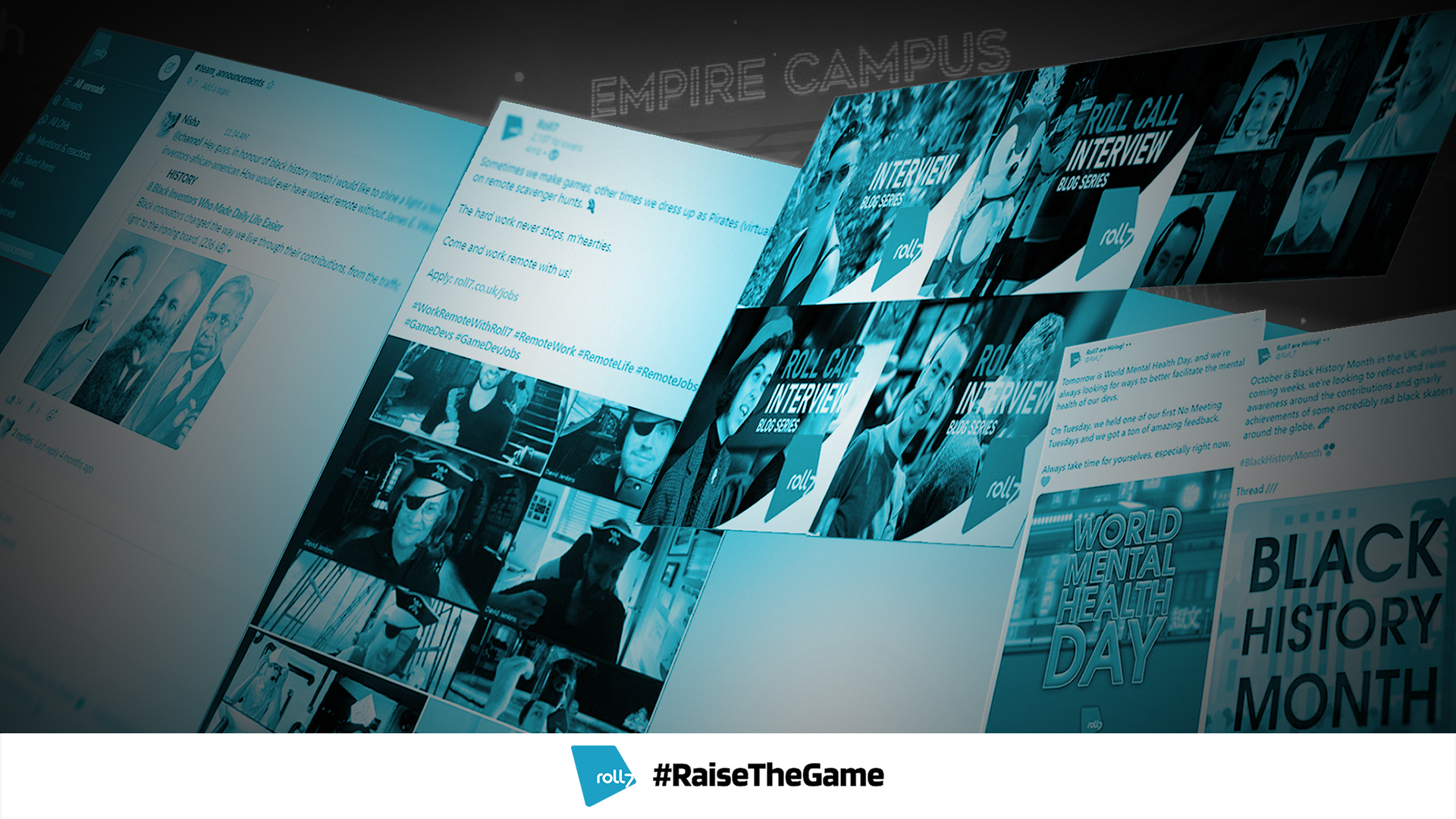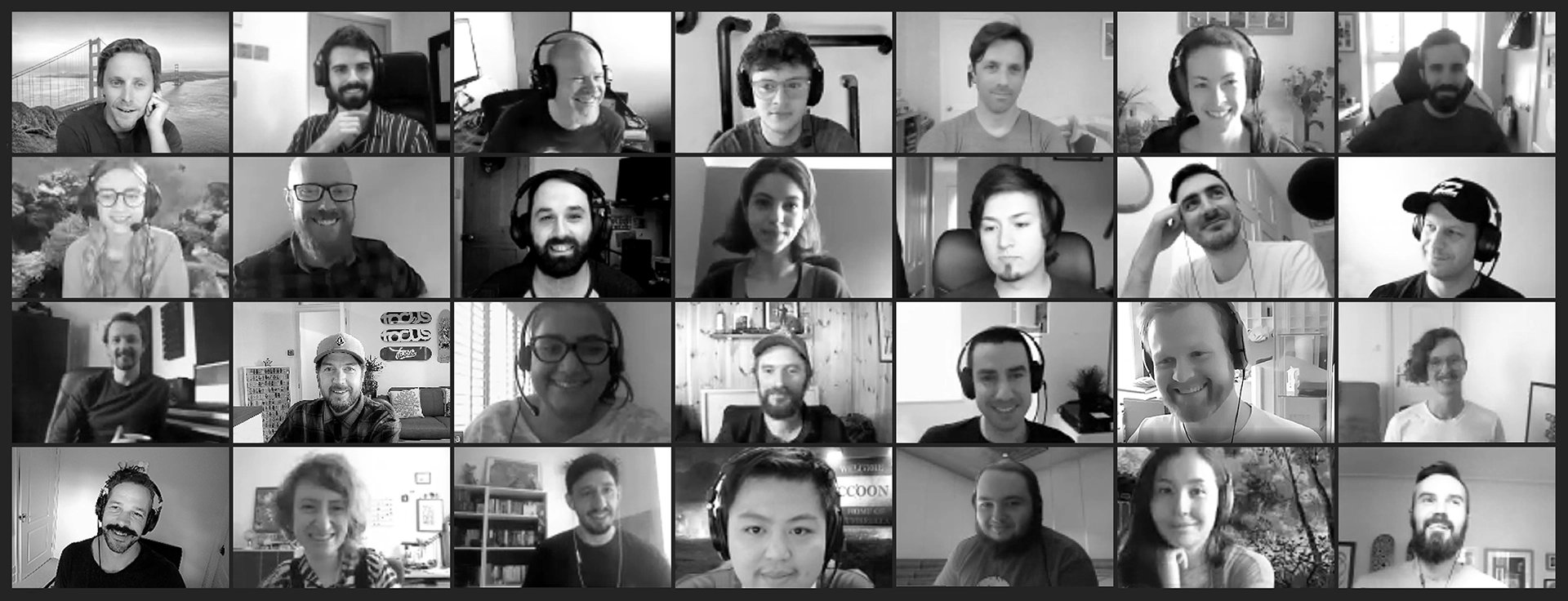One Year-On Pledge Partner Case Study: Roll7
By The Editor on 19/02/2021
As part of the 1 Year Anniversary for #RaiseTheGame we asked pledge partners and supporters to produce case studies for us to put towards our One Year-On Report.
The report is the pledge’s first accountability activity for partners and supporters, by giving organisations involved the chance to spotlight and talk about their involvement in the pledge along with all the equality, diversity and inclusion (EDI) efforts they are doing!
The aim of the report is not to name and shame organisations if controversies have occurred, or there are no developments in particular areas for some time, but to encourage and normalise honest conversation around recruitment, work practices and external representation. Giving those involved in the pledge a chance to reflect, be transparent and review their activities - to be accountable and see where they are doing good and/or can improve in.
On the other hand, the report is also about rejoicing best practice and the achievements many of our pledge partners and supporters have attained on their EDI journeys either on their own or with the help of the pledge. As #RaiseTheGame is all about collaboration and learning from each other - thus allowing our pledge partner and supporter case studies to also act as a resource for other games businesses and organisations to learn from and see how their peers are improving diversity and inclusion in their workplaces.

Having been apart of the pledge since it launched in February 2020, Roll7 have seen the entire year by our side. Here's how they are approaching the three pledge pillars and developed with the pledge one year-on:
When Roll7 signed up to the
#RaiseTheGame pledge, the company was not and had historically not been
especially diverse; in fact, to put it bluntly, it was primarily a “bunch of
white dudes”. We were determined to change this and in 2018 took active steps with
an initial focus on improving the gender, race and ethnicity balance. To be
clear. Our goal was not to hire based on those categories but to make our
company more inclusive, open and appealing in the hope that we could attract
the best talent – irrespective of individual characteristics.
We spoke with a number of people and organisations including BAME In Games and
Women In Games to see what practical steps we could take. There were a number
of things we did but the two most pertinent were:
1. Re-wording our Job ads: Making sure we weren’t being overly specific where
we didn’t need to be and really thinking about which skills were ‘essential’
and which were ‘nice to have’. Once you really drill into this area you realise
that very little is actually essential and in most cases you can look for a
broader skill base and personality type.
2. Revamping the messaging and images
on our website: It wasn’t until we analysed our website that we realised how
narrow it was in its appeal. The pictures and the tone were very much
aligned with our personal identity and was a reflection of the current state of
the company. There is still a lot more work to be done here but we have
actively made it a more welcoming and appealing place.
Both of these changes resulted in us receiving a far more diverse range of
applications, which in turn meant that the talent pool to select from was much
greater.

What have we done for one and/or each pledge pillar?
Pillar 1: Recruitment.
To really emphasise the difference the changes detailed above made, the figures speak louder than words:
In Q2 2019 there 9 of us: all white and identifying as male;
Now, in Q4 2020 over a year later, there are 51 of us in total with 11 people identifying as female and 40 as male.
With regards to race and ethnicity, of our 51-strong team, the vast majority would be categorised as white (with a range of backgrounds within that cohort) and 5 people would be categorised as being from non-white ethnic groups.
We realise that we have a long way to go and that diversity comes in many more forms than gender and ethnicity, but it does show how our changes have had an effect.
Pillar 2: Work culture, retention, training and
overall inclusivity towards staff.
There are a number of policies we have bought in this last year to work towards
Pillar 2.
No Crunch Policy: This is an absolute. So far, over a year on from its
introduction, there has been no crunch despite delivering some hefty
milestones. This is obviously a healthy and sensible way of working for all our
people but anecdotally, we know this especially benefits those with families
and other personal commitments.
Flexi-time Policy: This was introduced in early 2020 and allows the 7.5
hour work day to be spread between 7am and 7pm. The 12 hour window allows staff
to plan their work day effectively as well as tend to the necessary aspects of
their personal lives like attending doctor’s appointments and dropping the kids
to school; and all without having to take time out of their annual leave allowance.
This policy was subsequently enhanced with an Informal Flexible
Working Request which means Line Managers and senior management should remain
focused on outputs rather than where and when the work is carried out in line
with our remote studio working culture.
We
have also added the CIPD Inclusion calendar to help us celebrate significant
days for a wider breadth of cultures, religions and events. We message
internally and externally to further raise awareness and/or share information
about these events.
Pillar 3: diverse and inclusive representation in our games, events and all
other activities we engage in.
We have made huge strides in this area, but given where we are in development
we can’t announce anything just yet. What I can say is that our lead characters
and supporting ensemble reflect an incredibly broad spectrum of society and we can’t wait to show you how much
work we’ve done in this area.
Testimonials from the Team
-----------------------------------------------------------------------------------------------------
“It's made it easier for me to have open conversations about diversity when it comes to our games; we're pushing conversations around gender, ethnicity and sexuality even when it comes to our characters, customisation and self expression”
'Roll7 Employee’
-----------------------------------------------------------------------------------------------------
“I'm so proud to be working at a company that plays such a big part in the Raise The Game campaign”
'Roll7 Employee’
-----------------------------------------------------------------------------------------------------
“It's been really great to see all the discussions that have taken place around ensuring that there is fair representation of as many protected characteristics as possible”
'Roll7 Employee’
-----------------------------------------------------------------------------------------------------
“I think Roll7 being open and having a diversity of people from different backgrounds, interests and the ability to essentially 'own' a part of the project they've worked on helps me realize that dream of being able to contribute and help improve the projects we're all working on.”
'Roll7 Employee’
----------------------------------------------------------------------------------------------------
How has the pledge helped us and our EDI journey?
#RaiseTheGame has massively helped our ambition to create a more diverse workforce and to further promote diversity and inclusion through our games. Being part of a bigger initiative with specific pillars to address provides direction and more importantly helps us create a set of actions to make those thoughts reality.
The pledge has also had an empowering effect on our staff. In the early days, when we were still struggling to diversify, some of our staff were vocal in pressing us on the pledge we had publicly signed up to. This means that we are always being held to account on these pledges, ensuring we walk the talk.
Overall, it’s been a really positive year but we appreciate there is still more to do and will continue to work both internally and with #RaiseTheGame to ensure we continually honour the pledge.